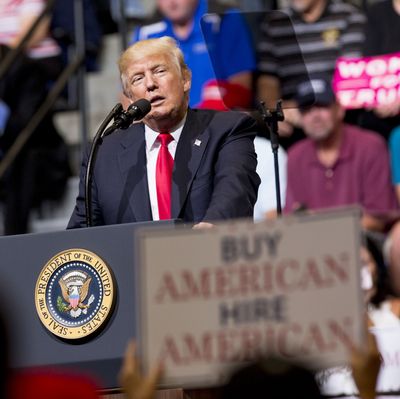
Shortly after taking office, President Trump signed an executive order drafted by senior White House aide Stephen Miller that banned refugees and people from seven Muslim-majority countries from entering the United States. Chaos ensued, and eventually the Trump administration issued a second, watered-down version of the travel ban. Federal judges blocked that order, too, but last month the Supreme Court let a very limited version of the travel restrictions go into effect until it hears the case in the next term.
Even this severely limited travel ban has faced legal challenges and sparked public outcry — most recently, over a group of Afghan girls barred from entering the U.S. to participate in an international robotics competition. President Trump intervened at the last minute to spare them from his own nonsensical travel restrictions.
Now, with the fate of the travel ban still unsettled, the Trump administration is turning its attention to a new, even dicier proposition. According to Politico, Stephen Miller is working with two Republican senators — Tom Cotton of Arkansas and David Perdue of Georgia — to dramatically scale back legal immigration. Currently about 1 million legal immigrants enter the U.S. each year, but if the bill, which is set to be introduced later this summer, is enacted, that number will be 500,000 by 2027.
Though it was largely overshadowed by talk of building a wall and deporting all 11 million undocumented immigrants, during the campaign Trump called for a crackdown on legal immigration as well. In August 2016, he said he wanted to keep immigration levels “within historic norms.” The campaign never clarified what that meant, but today the share of the U.S. population born abroad is about 14 percent, close to the all-time high of 14.8 percent in the 1890s. Under the current system it’s expected to increase to 18 percent by 2065.
In addition to reducing the overall number of immigrants entering the country, the legislation being drafted would shift the U.S. immigration system from favoring family unification to admitting people based on “merit, skill, and proficiency,” as Trump once put it. It’s said to be a revamped and expanded version of Cotton and Perdue’s Reforming American Immigration for Strong Employment (RAISE) Act, which the senators unveiled earlier this year. Here’s how Politico described the original version in February:
Right now, U.S. citizens and permanent residents can sponsor a variety of family members, including spouses, parents, siblings and married adult children. Cotton and Perdue’s plan would allow only spouses and unmarried minor children to get green cards, although they would permit visas for aging adult parents whose American children are their caretakers — a population Cotton expects will be modest.
The bill also dumps the diversity visa lottery, which allots about 50,000 visas per year for citizens of countries that traditionally have low rates of immigration to the United States. And it would limit refugees to 50,000 annually — in line with levels outlined in Trump’s controversial executive order.
The Trump administration has also been pushing for changes that would target the tired and poor element of the “huddled masses yearning to breathe free.” In January, they floated the idea of an executive order that would bar legal immigrants from the U.S. if they were likely to use any form of welfare. Last month Trump said such legislation was coming “very shortly.”
A senior administration official told Politico that the restriction will be part of the upcoming reorganization of the immigration system. “In order to be eligible for citizenship, you’ll have to demonstrate you are self-sufficient and you don’t receive welfare,” the senior administration official said. “You’re going to reduce low-skilled immigration substantially, which will protect American workers and recent immigrants themselves.”
Cotton similarly framed the issue as a way to help the working class. “Senator Cotton knows that being more deliberate about who we let into our country will raise working-class wages, which is why an overwhelming majority of Americans support it,” said his spokeswoman, Caroline Rabbitt. “He and Sen. Perdue are working with President Trump to fix our immigration system so that instead of undercutting American workers, it will support them and their livelihoods.”
Many economists say the idea that even legal immigrants are taking American jobs is incorrect. Last fall, a comprehensive report by the National Academies of Sciences, Engineering and Medicine found that over the past few decades, immigrants (both legal and illegal) have helped the U.S. economy and generally had little impact on the wages or employment levels of native-born Americans. In April 1,500 economists sent a letter to Trump and congressional leaders saying, “With the proper and necessary safeguards in place, immigration represents an opportunity rather than a threat to our economy and to American workers.”
Many Republicans — such as John McCain, Lindsey Graham, and Jeff Flake — agree that even low-skilled immigrants can be helpful to the economy, and were uninterested in the Cotton-Perdue legislation when it was originally introduced.
“I mean, if you go to Arizona, try to get a house delivered on time, whether it’s roofers or masons or anything else,” Flake said at the time. “There’s a huge shortage of labor. So we gotta take care of that.”
The stage is set for a showdown between the Republican Party’s immigration hawks and doves, but as Politico notes, it may not happen for some time:
It’s unclear how the White House could pull off such contentious legislation, given Congress is already bogged down in its attempt to repeal Obamacare and has not yet seriously started on tax reform and an infrastructure package — two other major GOP priorities. Congress must also pass legislation by this fall to avoid a government shutdown and to raise the debt ceiling.
The Trump administration may want to devote the rest of 2017 to fighting on multiple fronts its war on immigration, but once again Senate rules and political reality are standing in the way.






























